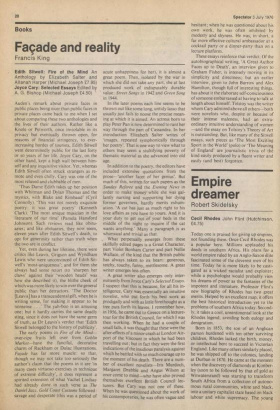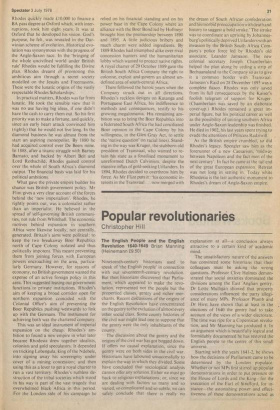Empire dreamer
Robert Skidelsky
Cecil Rhodes John Flint (Hutchinson, £4.75) Today one is praised for giving up empires, not founding them. Once Cecil Rhodes was a popular hero. Millions applauded his deeds in southern Africa. His plans for a world empire ruled by an Anglo-Saxon elite fascinated some of the cleverest men of his time. Today he is more likely to be castigated as a wicked racialist and exploiter; while a psychologist would probably view his dreams of power as the fantasies of the impotent and immature. Professor Flint's new biography of Rhodes has two great merits. Helped by an excellent map, it offers the best historical introduction yet to the problems of southern Africa today. Secondly, it takes a cool, unsentimental look at the Rhodes legend, avoiding both eulogy and denigration.
Born in 1853, the son of an Anglican parson burdened with ten other surviving children, Rhodes lacked the birth, money, or intellectual bent to succeed in Victorian England. Like many others similarly placed, he was shipped off to the colonies, landing at Durban in 1870. He came at the moment when the discovery of diamonds at Kimberley (soon to be followed by that of gold at Witwatersrand) was starting to transform South Africa from a collection of autonomous rural communities, white and black, into a unitary capitalist state based on black labour and white supremacy. The young
Rhodes quickly made £10,000 to finance a BA pass degree at Oxford which, with interruptions, took him eight years. It was at Oxford that he developed his vision. God's purpose, he felt, was revealed in the Darwinian scheme of evolution. Historical evolution was synonymous with the progress of the Anglo-Saxon race. In the 'bringing of the whole uncivilised world under British rule' Rhodes would be fulfilling the Divine plan. Rhodes dreamt of promoting this ambitious aim through a secret society modelled on the Jesuits and Freemasons. These were the lunatic origins of the vastly respectable Rhodes Scholarships.
In practical matters, Rhodes was far from lunatic. He took the sensible view that it was no use having big ideas, if one didn't have the cash to carry them out. So his first priority was to make a fortune, and quickly, since an early heart attack convinced him (rightly) that he would not live long. In the diamond business he was almost from the start an aspiring monopolist. By 1880 he had acquired control over De Beers mine. In 1888, after a titanic struggle with Barney Barnato, and backed by Albert Beit and Lord Rothschild, Rhodes gained control over the whole of South Africa's diamond output. The financial basis was laid for his political ambitions.
What gave the private empire builder his chance was British government policy. Mr Flint gives a very clear account of the forces behind the 'new imperialism'. Rhodes, he rightly points out, was a colonialist rather than an imperialist. He believed in the spread of self-governing British communities, not rule from Whitehall. The economic motives behind expansion in southern Africa were likewise locally, not centrally, generated. Britain's aims were political: to keep the two breakaway Boer Republics north of Cape Colony isolated and thus politically impotent. This meant preventing them from joining forces with European powers encroaching on the area, particularly Germany. However, for reasons of economy, no British government Wanted the expense of an active foreign policy in this area. This suggested leasing out government functions to private institutions. Rhodes's aim of keeping a broad corridor open for northern expansion coincided with the Colonial Office's aim of preventing the Boer Republics pushing westwards to link up with the Germans. The instrument for achieving both was the chartered Company.
This was an ideal instrument of imperial expansion on the cheap. Rhodes's ambition to found a new empire in what later became Rhodesia drew together idealists, colonists and gold speculators. It depended on tricking Lobengula, king of the Ndebele, into signing away his sovereignty under cover of a mining concession; and then using this as a lever to get a royal charter to run a vast territory. Rhodes's ruthless destruction of the tribal Societies which stood in his way is part of the vast tragedy that overwhelmed black Africa in this period. For the London side of his campaign he relied on his financial standing and on his power base in the Cape Colony where an alliance with the Boer Bond led by Hofmeyr brought him the premiership between 1890 and 1895. A little judicious bribery and much charm were added ingredients. By 1889 Rhodes had triumphed alike over rival concession hunters and the humanitarian lobby which wanted to protect native rights. A royal charter of 29 October 1889 gave the British South Africa Company the right to colonise, exploit and govern an almost undefined area of south-central Africa.
There followed the heroic years when the Company struck out in all directions. Rhodes's reckless designs on Katanga and Portuguese East Africa, his indifference to methods and consequences, testify to his growing megalomania. His remaining ambition was to bring the Boer Republics into a federated South Africa (he had conciliated Boer opinion in the Cape Colony by his willingness, in the Glen Gray Act, to settle the 'native question' on racial lines)..Standing in the way was Kruger, the stubborn old president of Transvaal, who wanted to retain his state as a fossilised monument to unreformed Dutch Calvinism, despite the massive influx of gold-seeking Uitlanders. In 1894, Rhodes decided to overthrow him by force. As Mr Flint puts it : 'his economic interests in the Transvaal ... now merged with
the dream of South African confederation and his morbid preoccupation with death and history to suggest a bold stroke.' The stroke was to coordinate an uprising by Johannesburg's politically deprived Uitlanders with an invasion by the British South Africa Company's police force led by Rhodes's old associate, Leander Jameson. The new colonial secretary Joseph Chamberlain helped the plan along by ceding a strip of Bechuanaland to the Company so as to give it a common border with Transvaal. Jameson's Raid on 28 December 1895 was a complete fiasco. Rhodes was only saved from its full consequences by the Kaiser's foolish telegram of support for Kruger. (Chamberlain was saved by an elaborate cover-up.) Rhodes remained a great imperial figure, but his political career as well as the possibility of uniting southern. Africa under Anglo-Saxon leadership was finished. He died in 1902, his last years spent trying to evade the attentions of Princess Radziwill.
As the British empire crumbled, so did Rhodes's legacy. Spengler saw him as the forerunner of a new Caesarism, 'midway between Napoleon and the fact men of the next century'. In fact he came at the tail end of the great European expansion. Retreat was not long in setting in. Today white Rhodesia is the last authentic monument to Rhodes's dream of Anglo-Saxon empire.



































 Previous page
Previous page